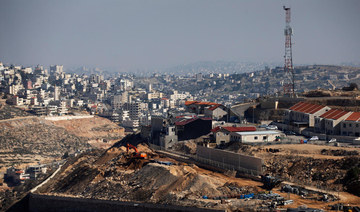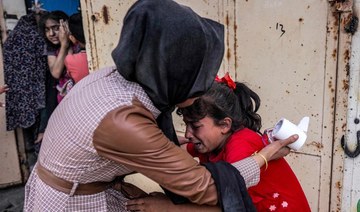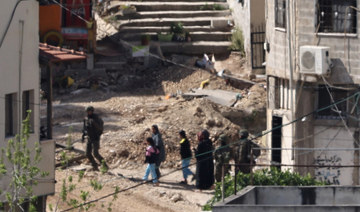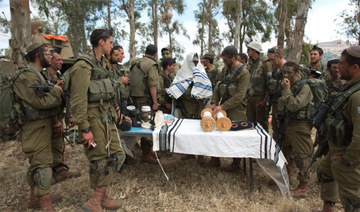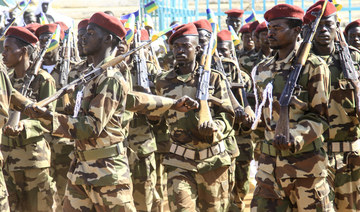JERUSALEM: Israeli Prime Minister Benjamin Netanyahu received crucial support in his bid to form a unity government Thursday, inching closer to ending more than a year of political deadlock.
Lawmakers first voted in favour of a coalition pact between Israel's longest-serving leader and his erstwhile rival Benny Gantz, then called on President Reuven Rivlin to task Netanyahu with forming that government.
The coalition deal will see the rightwing veteran premier share power with Gantz, a centrist former military chief.
The two men plan to swear in their new administration on May 13, with Netanyahu remaining leader for 18 months, before handing over to Gantz.
The other will serve as alternate PM, a newly created position.
Representatives of Netanyahu's Likud party and Gantz's Blue and White presented Rivlin's office with a request, signed by 72 of the country's 120 MPs, that Netanyahu be mandated to form a government.
It was delivered hours ahead of a midnight (2100 GMT Thursday) deadline.
A statement from the presidency said the law allowed up to two days for possible objections before the process was finalised.
The proposed government had also been challenged in the high court, with opponents arguing Netanyahu was ineligible due to corruption indictments.
But the court ruled on Wednesday evening that there was "no legal reason to prevent the formation of a government" led by Netanyahu.
It added that the allegations against Netanyahu could be addressed in his trial, due to begin on May 24.
Netanyahu has been written off by pundits and rivals many times since taking power in 2009, but the man sometimes dubbed "the magician" has invariably found ways to remain in the hot seat.
As well as rebuilding an economy shaken by the coronavirus, the new government will also decide on the possible annexation of large parts of the West Bank, a move from which successive governments have refrained since Israel occupied the territory in the Six-Day War of 1967.
Israel has been without a stable government since December 2018, holding three successive elections in which Gantz's centrist Blue and White and Netanyahu's Likud were near neck-and-neck.
Netanyahu has remained in power in a caretaker capacity throughout.
In January, he was charged with accepting improper gifts and illegally trading favours in exchange for positive media coverage.
He denies wrongdoing, but if the trial goes ahead as planned he will become the first serving Israeli leader to be tried.
After the third election in March, Gantz broke with large parts of Blue and White and agreed to form a unity government.
He said it was necessary to provide political stability as the country seeks to repair the economic damage wrought by a coronavirus outbreak that has infected more than 16,000 people.
Gantz's critics, including many former allies, accused him of betraying his voters after campaigning for cleaner politics and pledging not to serve under an indicted prime minister.
"Never have so few cheated so many voters for such miserable reasons," former Gantz ally Yair Lapid, poised to become opposition leader, tweeted Thursday.
Yohanan Plesner, president of the Israel Democracy Institute think tank, said neither Gantz nor Netanyahu had faith in the other's intentions.
"There is zero trust -- this is probably the main characteristic of this political agreement," he told journalists.
"Therefore a new regime was created whereby we have two prime ministers, both with veto power."
Israel lawmakers endorse Netanyahu-Gantz government
https://arab.news/zvgam
Israel lawmakers endorse Netanyahu-Gantz government
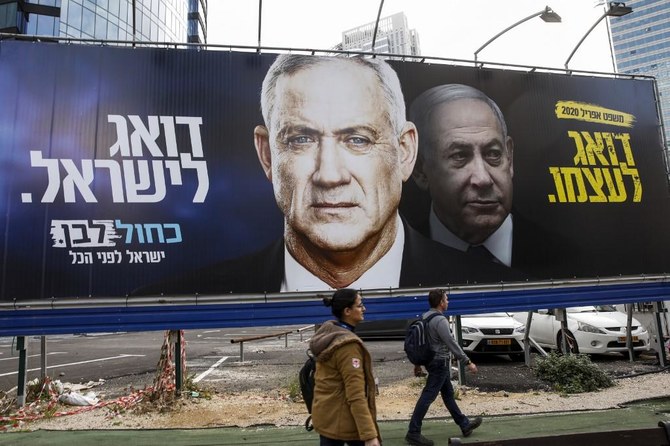
- The two men plan to swear in their new administration on May 13, with Netanyahu remaining leader for 18 months, before handing over to Gantz
Houthis claim attack on Greek merchant vessel off Yemen

The US Central Command, or CENTCOM, said the Houthis had targeted MV Cyclades, a Greek commercial vessel flying the Maltese flag, with three anti-ship ballistic missiles and three drone strikes.
“Initial reports indicate there were no injuries and the vessel continued on its way,” CENCOM posted on X, formerly Twitter.
Earlier, the UK Maritime Safety Agency (UKMTO) reported explosions “in close proximity” to a commercial ship sailing off the Yemeni coast northwest of Mokha.
“Vessel and crew are reported safe,” the agency, run by the Royal Navy, added.
Maritime security firm Ambrey said the Malta-flagged container ship was en route from Djibouti to Jeddah and was likely targeted “due to its listed operator’s ongoing trade with Israel.”
Houthi rebels claimed responsibility for firing at the Cyclades, MSC Orion and two US vessels.
The Iran-backed group, which controls the Yemeni capital Sanaa and much of the country’s Red Sea coast, has launched a flurry of attacks against ships since November.
It says their campaign is in solidarity with Palestinians amid the Gaza war.
CENTCOM also said that US forces shot down an unmanned aerial vehicle (UAV) over the Red Sea on Monday morning as it was headed on a flight path “toward USS Philippine Sea and USS Laboon.”
“The UAV presented an imminent threat to US, coalition, and merchant vessels in the region,” it wrote on X, adding that there had been no injuries or damage reported by US forces or nearby commercial ships.
Since January, the United States and Britain have launched repeated strikes on Houthi targets in Yemen in response to the ship attacks.
Hamas prepares response to Gaza truce offer
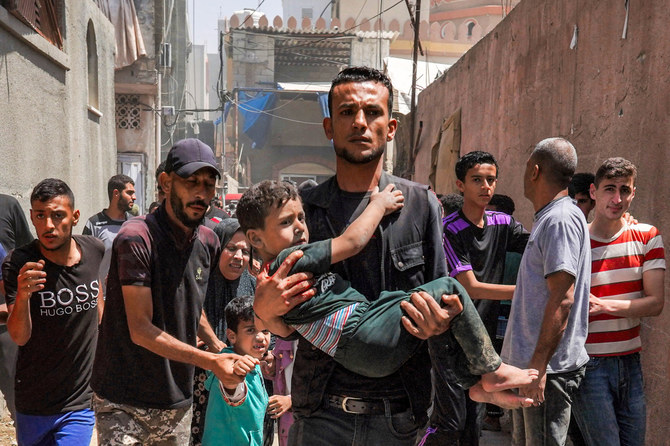
- Returning to Qatar after the latest talks in Cairo, the Hamas delegation said it would “discuss the ideas and the proposal”
JERUSALEM: Hamas was studying Tuesday Israel’s offer of a 40-day truce in the war in the Gaza Strip in exchange for the release of scores of hostages held since the Palestinian militant group’s October 7 attacks.
Returning to Qatar after the latest talks in Cairo, the Hamas delegation said it would “discuss the ideas and the proposal... we are keen to respond as quickly as possible,” a Hamas source told AFP on condition of anonymity.
Egyptian sources told Al-Qahera News, a site linked to Egyptian intelligence services, that the Hamas delegation would “return with a written response.”
US Secretary of State Antony Blinken described the truce terms as “extraordinarily generous,” while the White House asked fellow mediators Egypt and Qatar to increase pressure on Hamas to accept the latest push to halt the nearly seven-month-old war.
According to Monday night call readouts, US President Joe Biden urged the Egyptian and Qatari leaders “to exert all efforts to secure the release of hostages held by Hamas,” calling this “the only obstacle” to securing relief for civilians in the besieged strip.
For months, Egypt, Qatar and the United States have been trying to secure a new agreement between the combatants. A one-week truce in November saw 80 Israeli hostages exchanged for 240 Palestinians held in Israeli prisons.
Relentless Israeli bombardment has meanwhile devastated Hamas-run Gaza, flattening much of the territory and bringing its people to the brink of famine, while threatening to unfurl into a wider regional conflict.
In the far southern city of Rafah, Palestinians despaired over the war while searching for victims of the latest strike.
“Civilian individuals with no ties to Hamas or any other group were struck by a rocket, torn apart,” Um Louay Masri said at a destroyed building where children were being pulled out from underneath the rubble. “Why did this occur?“
To global alarm, Israel has vowed to go after Hamas battalions in Rafah, where the majority of Gaza’s 2.4 million people have sought refuge.
But Foreign Minister Israel Katz said over the weekend the government may “suspend” that operation if a truce is reached.
Blinken’s Mideast tour
Speaking in Riyadh on his seventh visit to the region since the start of the war in Gaza, top US diplomat Blinken underscored the need for Hamas to “decide quickly” on the truce.
He told a World Economic Forum special meeting that he was “hopeful that they will make the right decision.”
At the WEF meeting, Egypt’s Foreign Minister Sameh Shoukry said “the proposal has taken into account the positions of both sides.”
“We are hopeful,” he added.
British Foreign Secretary David Cameron said that Hamas has been offered a “sustained 40 days’ ceasefire, the release of potentially thousands of Palestinian prisoners, in return for the release of these hostages.”
On the sidelines of the WEF, US, European and Arab representatives met to discuss how to advance a two-state solution to the Israeli-Palestinian conflict.
Saudi Foreign Minister Prince Faisal bin Farhan told the gathering that tangible and irreversible steps toward establishing a Palestinian state would be an essential component of any durable ceasefire deal.
To incentivise Israel to support a Palestinian state, Washington has pushed the prospect of normalized Israel-Saudi relations, with Blinken suggesting Monday that some progress was being made in that arena.
Israeli Prime Minister Benjamin Netanyahu is a long-standing opponent of Palestinian statehood however, and Israel has previously rejected a permanent ceasefire.
A Hamas source has told AFP the group is keen for a deal that “guarantees a permanent ceasefire, the free return of displaced people, an acceptable deal for (a prisoner-hostage) exchange and an end to the siege” in Gaza.
Mounting pressure
Netanyahu is under tremendous pressure from the families of hostages taken by Hamas in the October 7 attack to secure their release.
On Monday, the families of two Israeli captives seen alive in a video released by Hamas last weekend called for their release.
“I demand the leaders of the free world to help us bring our people home,” said Aviva Siegel, who was freed in the November truce and is the wife of captive Keith Siegel.
Israel estimates 129 hostages remain in Gaza, including 34 believed to be dead.
Hamas’s attack resulted in the deaths of about 1,170 people in Israel, mostly civilians, according to an AFP tally based on Israeli official figures.
Israel’s retaliatory offensive has killed at least 34,488 people in Gaza, mostly women and children, according to the health ministry in the Hamas-run territory.
That tally includes at least 34 deaths in a 24-hour window, the ministry said Monday, down from a peak this month of at least 153 deaths on April 9.
At Rafah’s Al-Najjar hospital, a crowd of grief-stricken relatives jostled over the dead, shrouded in white.
“We demand the entire world to call for a lasting truce,” Abu Taha said at the hospital.
Access of aid
After an Israeli drone strike in early April killed seven workers from a US-based charity, Biden suggested to Netanyahu, for the first time, that continued US support could be conditional on protection and aid for civilians.
On Sunday, the White House said Israel was letting more aid trucks into Gaza in line with “commitments” Biden asked it to meet.
The UN has, however, continued to cite “access constraints” that significantly hinder delivery.
The US military is building a pier to help boost humanitarian supplies — an effort that the Pentagon on Monday said would cost Washington at least $320 million.
The UN has warned a heatwave and the proliferation of insects are increasing the risk for diseases at the swelling tent cities in Gaza.
“I have sick children who cannot tolerate the heat,” said Alaa Al-Saleh, a Palestinian displaced to an encampment in Rafah. “We are cramped inside the tent, rarely going outside.”
Suspected Al-Qaeda explosion kills 6 troops loyal to secessionist group in Yemen
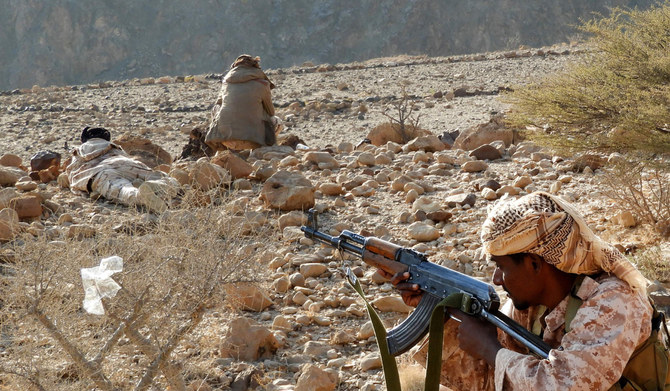
- AQAP is seen as one of the more dangerous branches of the terror group still operating more than a decade after the killing of founder Osama bin Laden
SANAA, Yemen: An explosive device detonated and killed six troops loyal to a United Arab Emirates-backed secessionist group Monday in southern Yemen, a military spokesman said, the latest attack blamed on Al-Qaeda militants in the impoverished Arab country.
The explosion hit a military vehicle as it passed in a mountainous area in the Modiyah district of southern Abyan province, said Mohamed Al-Naqib, a spokesman for the Southern Armed Forces, the military arm of the secessionist Southern Transitional Council.
Eleven other troops were wounded, he added.
It is at odds with the internationally recognized government, although they are allies in Yemen’s years long war against the Iranian-backed Houthi rebels who control the north and the capital Sanaa.
Al-Naqib blamed Al-Qaeda in the Arabian Peninsula, or AQAP, for the attack.
AQAP is seen as one of the more dangerous branches of the terror group still operating more than a decade after the killing of founder Osama bin Laden.
It is active in several regions in Yemen, exploiting the country’s civil war to cement its presence in the nation at the southern tip of the Arabian Peninsula.
Yemen’s ruinous civil war began in 2014 when the Houthis seized the capital of Sanaa and much of northern Yemen and forced the internationally recognized government into exile.
US says five Israeli military units committed abuses in West Bank
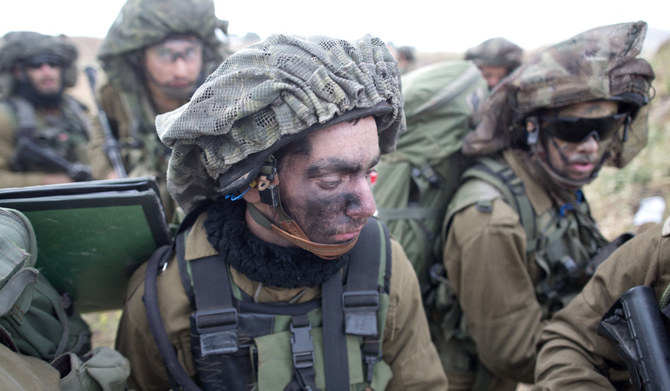
- Israel has killed more than 34,000 Palestinians, according to Gaza’s Health Ministry
- Press reports have identified a battalion called the Netzah Yehuda, composed mainly of ultra-Orthodox Jews, as being accused of abuses. It is about 1,000-strong and since 2022 has been stationed in the West Bank, which Israel has occupied since 1967
WASHINGTON: The United States has concluded that five Israeli security force units committed serious human rights violations against Palestinians in the West Bank before the Hamas attack in October, the State Department said Monday.
Israel has taken remedial measures with four of these units, making US sanctions less likely. Consultations are under way with Israel over the fifth unit, State Department deputy spokesman Vedant Patel told reporters.
He declined to identify the units, give details of the abuse, or say what measures the Israeli government had taken against them.
A US official speaking on condition of anonymity said the fifth unit is part of the army.
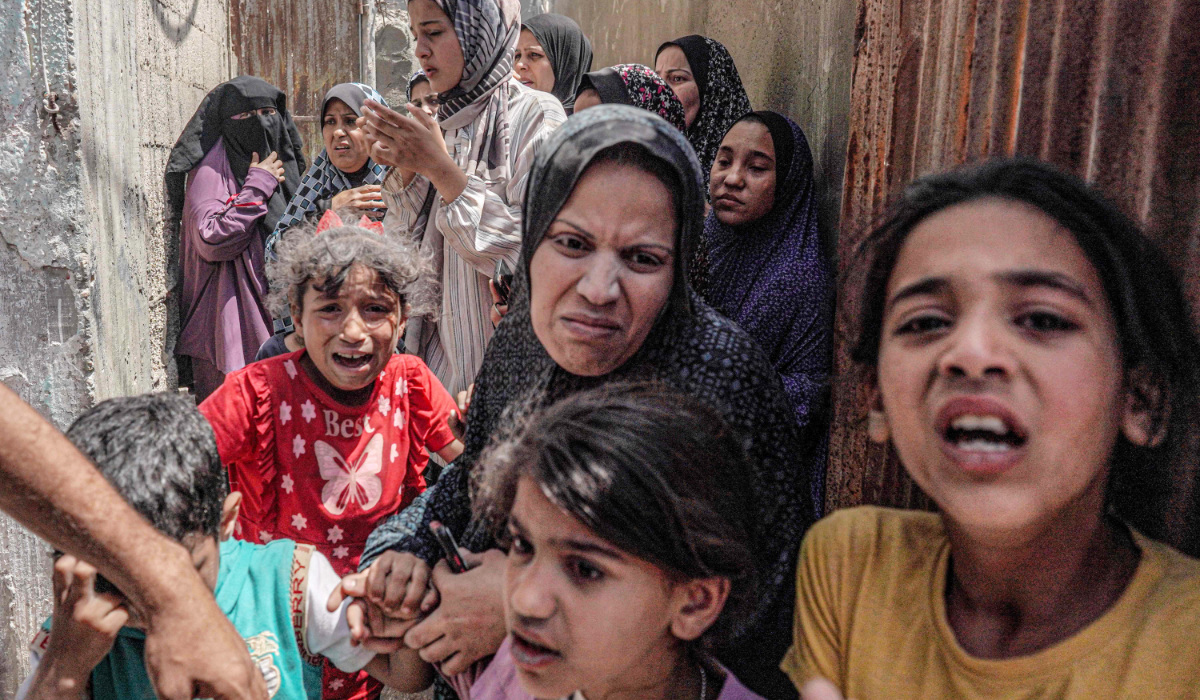
Press reports have identified a battalion called the Netzah Yehuda, composed mainly of ultra-Orthodox Jews, as being accused of abuses.
It is about 1,000-strong and since 2022 has been stationed in the West Bank, which Israel has occupied since 1967.
“After a careful process, we found five Israeli units responsible for individual incidents of gross violations of human rights,” Patel said.
All the incidents took place before the October 7 Hamas attack and were not in Gaza, he added.
“Four of these units have effectively remediated these violations, which is what we expect partners to do, and is consistent with what we expect all countries whom we have a secure relationship with,” said Patel.
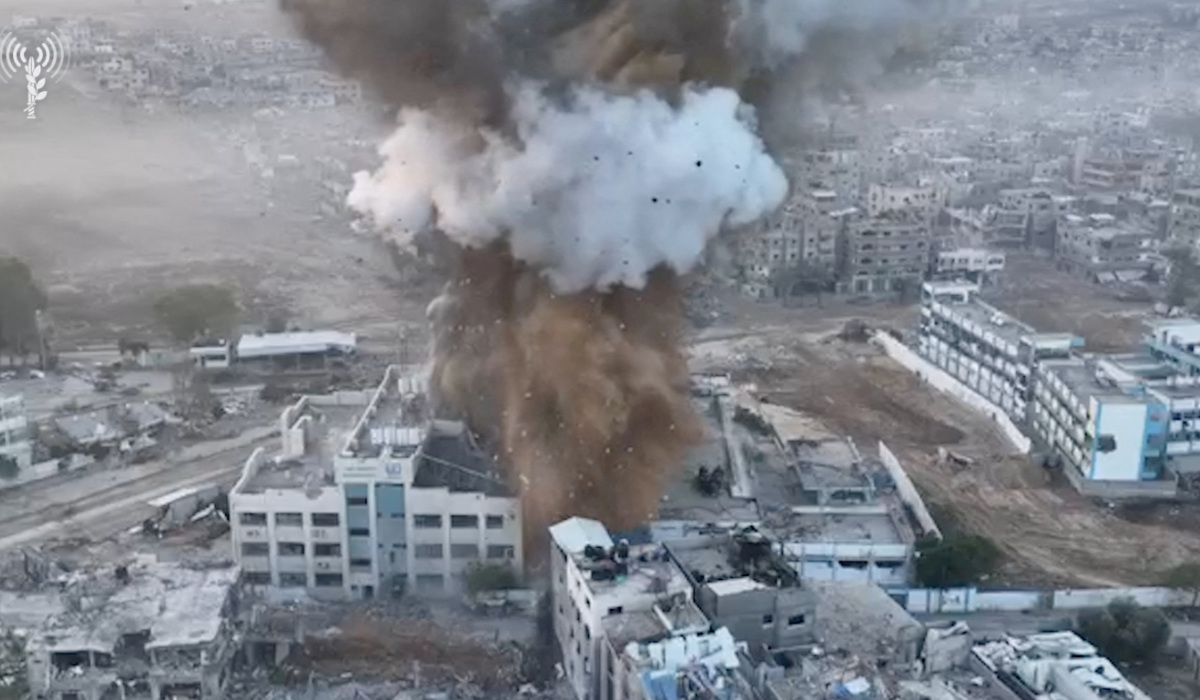
Israel has provided “additional information” about the fifth unit, he added.
US law bars the government from funding or arming foreign security forces against which there are credible allegations of human rights abuses.
The United States provides military aid to allies around the world, including Israel.
The Israeli army has been fighting the militant Palestinian group Hamas in the Gaza Strip for almost seven months and is trading fire almost every day with Hezbollah along the border with Lebanon. Both groups are backed by Iran.
Prime Minister Benjamin Netanyahu reacted angrily to recent news reports that the United States might slap sanctions against a unit of the Israeli military because of human rights abuses, saying the army should not be punished with the country at war.
Patel said the United States is continuing its evaluation of the fifth army unit and has not decided whether to deny it US military assistance.
This case comes with the administration of President Joe Biden under pressure to demand accountability from Israel over how it is waging war against Hamas, with such a high civilian death toll.
In an election year, more people are calling for the United States to make its billions of dollars in annual military aid to Israel contingent on more concern for Palestinian civilians. Pro-Palestinian protests are also sweeping US college campuses.
Hamas’ October attack in Israel resulted in the deaths of about 1,170 people in Israel, mostly civilians, according to an AFP tally based on Israeli official figures.
Israel’s retaliatory offensive has killed at least 34,488 people in Gaza, mostly women and children, according to the health ministry in the Hamas-run territory.
US warns of ‘large-scale massacre’ in Sudan city
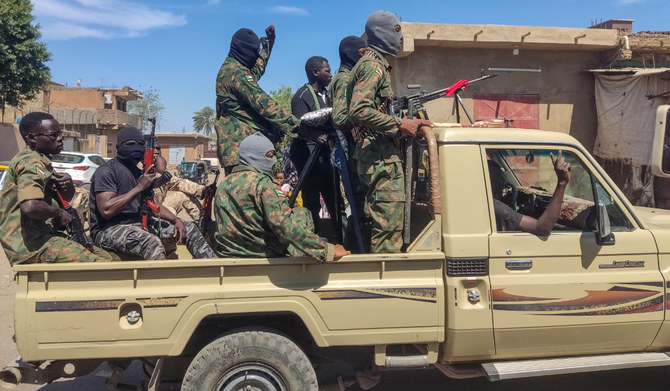
- Millions have been displaced in the country since fighting began last year between the SAF forces of General Abdel Fattah Al-Burhan and RSF paramilitaries under General Mohamed Hamdan Dagalo
UNITED NATIONS, United States: The US ambassador to the United Nations on Monday warned of an impending “large-scale massacre” in the Sudanese city of El-Fasher, a humanitarian hub in the Darfur region.
The city had until recently been relatively unaffected by fighting between the Sudanese Armed Forces (SAF) and the Rapid Support Forces (RSF), but bombardment and clashes have been reported both there and in surrounding villages since mid-April.
El-Fasher “is on the precipice of a large-scale massacre. This is not conjecture. This is the grim reality facing millions of people,” Linda Thomas-Greenfield told journalists following a UN Security Council meeting on Sudan.
“There are already credible reports that the RSF and its allied militias have razed multiple villages west of El-Fasher, and as we speak, the RSF is planning an imminent attack on El-Fasher,” which “would be a disaster on top of a disaster,” Thomas-Greenfield said.
Millions have been displaced in the country since fighting began last year between the SAF forces of General Abdel Fattah Al-Burhan and RSF paramilitaries under General Mohamed Hamdan Dagalo.
El-Fasher functions as the main humanitarian hub in the vast western region of Darfur, home to around a quarter of Sudan’s 48 million people.



